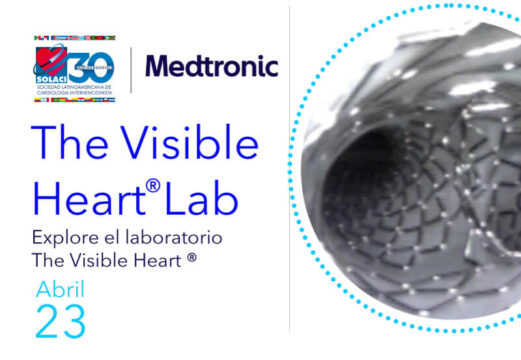
Since 1993, when the Latin American Group of Interventional Cardiology (GLACI) ─ precursor of SOLACI ─ was created in Mexico, Lluberas has been on the front line, inspired by the original idea: to fund a strong Society to represent all of interventional cardiologists across Latin America.
“Our Society was forged by a group of pioneers of interventional cardiology in Latin America that saw the need to pull together to advance in our field. There was spirit of solidarity among our members. This is what we have to preserve now, the idea that together we are more”, claims the current president of SOLACI.
With the same passion he has for cardiology and education, and to keep the legacy of SOLACI founders, Lluberas responds each of the questions for solaci.org.
You are Uruguayan, but born in Paris, France. How did this happen?
My father had been appointed to the Uruguayan Embassy in France. I was born there but I’m as Uruguayan as any one born here. My parents and all my direct family is Uruguayan and, legally, I am as well, despite my place of birth, France. Uruguay is the best country to live, I have no doubt about that.
Do you come from a family of physicians or were you the first to become a physician?
My grandfather was a chemist and my eldest brother is a dentist, but there are no physicians in my family tree. I’ve always had an interest in health care, since I was a child. I think it was a sense of duty to serve others what lured me into this profession.
Why did you choose interventional cardiology out of all specialties?
I’ve been passionate about cardiology since young age and I originally specialized in clinical cardiology. My personal profile as a clinician, which I would define as pragmatic, oriented my practice towards conclusive definitions. Interventional cardiology has that: accurate diagnostics and the chance to act accordingly, effective and efficiently. Also, in the 80’s, when I made up my mind, the discipline was booming with the introduction of coronary angioplasty.
What are the greatest satisfactions your career has brought you?
My greatest satisfaction is to be able to achieve the best results in the daily practice, to see a patient evolve successfully after a medical intervention and be able to share it with our colleagues. Also, to see the joy of their family. Academically, to be Head Professor of Cardiology at Universidad de la República (Uruguay) and the honor of being elected president of SOLACI.
What are the greatest challenges up ahead?
The greatest challenge is to achieve excellence in interventional cardiology in an environment fraught with difficulties, because we are in the third world. This is when we come to appreciate the outstanding quality of our colleagues, who still manage to achieve diagnostic, therapeutic and knowledge advances despite our ever-adverse technical and economic conditions.
What does teaching mean to you?
It’s an important part of my life. Ultimately, it is wonderful to be able to pass on what we have learnt, even better when it can be improved by our colleagues. Besides, when you teach, you also learn.
Your son is also an interventional cardiologist. What advice have you given him since he has started on this path?
Beyond technical advice, that I give him and other young physicians whom I interact with daily, my major concern is ethical; essentially, that they don’t lose sight of patients and our society. We have taken on the responsibility towards patients, as well as society, to provide the best health care that conscious educated training can provide.
SOLACI: an unlimited source of stories and challenges

“Given the choice, I’d pick two. The first one is a funny film our Argentinian colleagues made for one of our annual meetings in Buenos Aires, around 15 years ago. They put together a wonderful tango tale starring the Argentinian interventionists. Some of them represented infamous tango characters such as “El Gato Maula”, embodied by (Jorge) Belardi, and “La Rubia Mireya”, by Liliana Grinfeld!”, Lluberas laughed.
And the second?
We’ve recently held SOLACI Sessions in Cuba and, during the images contest, at the award ceremony, I asked Omar Santaera, our Treasurer, if we could give tickets and accommodation to SOLACI Río 2016, and he answered yes. When we announced the winner, we heard a very loud cry in the audience. It was Roger, a young Cuban colleague. Only a few days later did I understand his joy: he had never travelled before. Quoting Roger from an email he sent me: “terrific experience”. Four months later, we met with Roger; he was fascinated by all he had seen and learnt at the meeting ─ and for all he had danced at the closing party. At this party, Omar Santaera told me: “No better use for this money” (laughing).
Has any SOLACI member been a role model to the young Lluberas setting off on this journey?
Many of SOLACI pioneers have guided my first steps. To mention two, doctors Eduardo de Souza and Fausto Buitron.
What do you think are the greatest challenges SOLACI faces?
SOLACI has to uphold Latin America integration as the guiding principle set by our founders. In this regard, the greatest challenges are, on one hand, to maintain our society, despite the adverse economic outlook. On the other hand, to develop SOLACI with a strong educational profile, with our current structure: ProEducar, SOLACI website, Sessions, Annual Meeting and Solidarity Program. Finally, to draw up a course for future interventionists to address education needs in Latin America, and to continue to advance scientific knowledge in our field.



